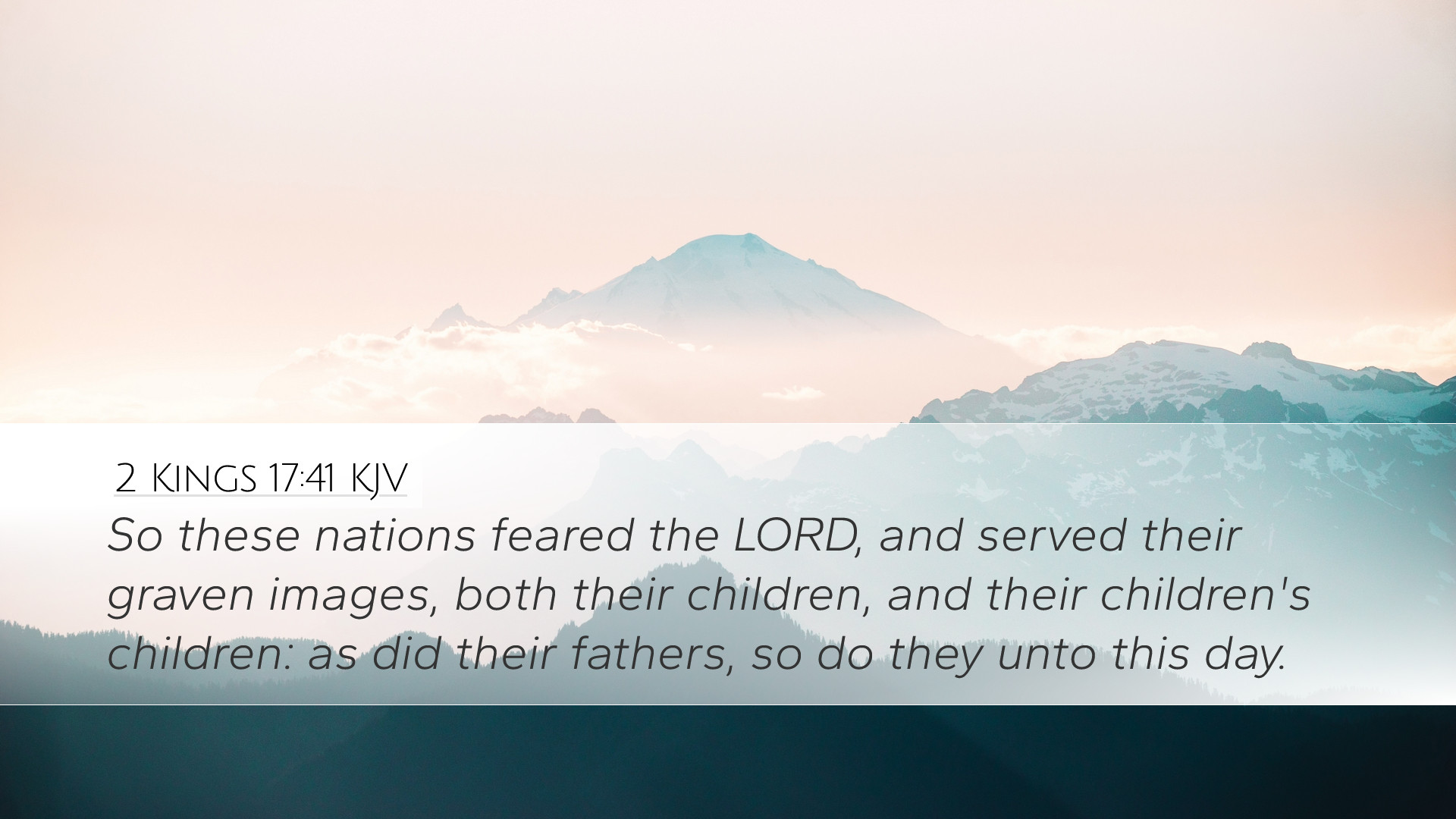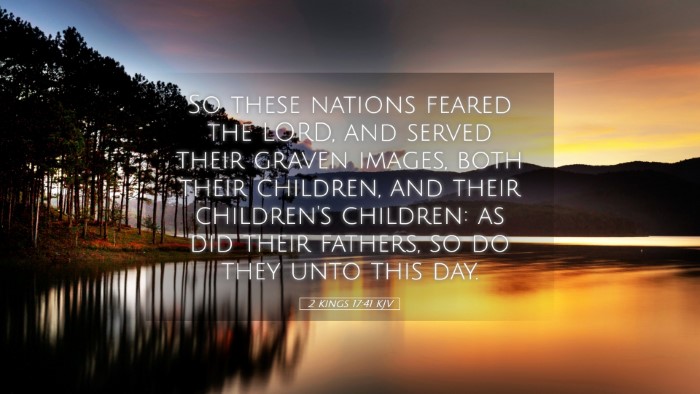Commentary on 2 Kings 17:41
Verse: "So these nations feared the Lord, and served their graven images, both their children, and their children's children: as did their fathers, so do they unto this day." (2 Kings 17:41)
Introduction
This verse provides a crucial reflection on the spiritual condition of the nations that had settled in the land of Israel after the Assyrian conquest. It highlights the mingling of reverence for the Lord with idolatrous practices, a theme prevalent throughout the history of Israel and its neighbors. In understanding this verse, we draw insights from notable public domain commentaries.
Historical Context
To appreciate the significance of this verse, it is paramount to comprehend the historical backdrop of the events occurring in the Northern Kingdom of Israel and the resultant societal shift following the conquest by Assyria. The Assyrians resettled various peoples in Israel, leading to a syncretism of worship practices.
Insights from Commentaries
Matthew Henry's Commentary
Matthew Henry emphasizes the conflict of worship present in this verse. He notes that while the nations developed a fear of the Lord—a God whose power was evident—they simultaneously clung to their own idols. Henry posits that this duality exemplifies the heart's propensity to mix truths, resulting in a compromised faith. It reflects the reality that many individuals might acknowledge God yet remain tied to their ancestral beliefs.
Albert Barnes' Notes on the Whole Bible
Barnes highlights the irony that these nations “feared the Lord” yet served images made by hands. He elaborates on the concept of syncretism, illustrating that the fear of God manifested in a superficial manner, devoid of genuine loyalty. He underscores the continued influence of these idolatrous practices through generations, suggesting a spiritual inertia where each successive generation mimics the shortcomings of the previous. Barnes hints at the need for authentic devotion, contrasting the heart that truly seeks the Lord versus one that merely adopts a façade of worship.
Adam Clarke's Commentary
Adam Clarke provides an insightful exposition on the term "feared the Lord." He indicates that while they acknowledged the Lord during times of trial or calamity, their worship was ultimately insincere and disorderly, as they also turned to their idols. Clarke astutely notes that this hybrid worship led to a cycle of spiritual lethargy, where forgetting the Lord was as instinctive as the act of idol worship itself. He calls attention to the generational aspect, signifying the potential long-lasting effects of such practices, which can become entrenched in culture.
Theological Implications
This verse invites several theological reflections:
- The Nature of True Worship: It emphasizes the importance of authentic worship and warns against the blending of faith with secular or idolatrous practices. True reverence for God must exclude any form of idolatry.
- The Impact of Culture on Faith: The passage illustrates the influence of prevailing cultural practices on authentic spirituality. It serves as a reminder for communities of faith to guard against dilution of their beliefs.
- Generational Consequences: The recurring phrase “as did their fathers” suggests a sobering reality concerning the transmission of both beliefs and practices from one generation to another.
Practical Applications
For pastors, theologians, and students of Scripture, several practical applications can be gleaned from this text:
- Encourage Authentic Worship: Engage communities in discussions about the nature of true worship and challenge them to reflect on any areas where they may have blended cultural practices with their faith.
- Address Cultural Influence: Foster awareness about how cultural elements can infiltrate and distort authentic faith expressions, urging congregations to evaluate their worship against biblical standards.
- Focus on Discipleship: Emphasize the importance of teaching successive generations about a radical commitment to God that disentangles them from the idols of modern culture.
Conclusion
2 Kings 17:41 serves as a poignant reminder of the complexities of worship and belief. As seen through the commentaries of Matthew Henry, Albert Barnes, and Adam Clarke, the nuances of fear, reverence, and idolatry provide substantial ground for reflection. This mixture manifests not only in ancient Israel but resonates within contemporary faith communities, calling for vigilance and a return to authentic devotion.


